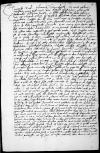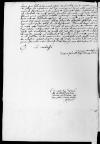De meis calamitatibus, quas post vestrum hinc discessum passus sum, multa essent scribenda. Sed quia timeo, ne affectus et dolor ipse, qui nunc me occupat, plura, quam epistola desiderat, ferat, paucis me expediam. Vesperi, dum Generositas Vestra mecum erat in symposio, ut scitum, exorta erat quaedam controversia inter famulum meum et ⌊Laurentium⌋ quendam istius ⌊de Elss⌋ ⌊Cruciferorum⌋ famulum, quae utcumque fuit sopita. Postero die conveni dictum ⌊Laurentium⌋, ut me certiorem redderet, quamobrem omnia essent acta. Respondit, quod propter quaedam verba, quae hospita mea se a meo servitore retulisset audivisse. Discessum est inter nos in fine, quod idem ⌊Laurentius⌋ nihil vel contra me aut meum famulum praetenderet agere, immo ubi mihi possit obsequi, obtulit se libenter facturum. Quod etiam ⌊caesareae maiestatis⌋ aulico domino Elsenhemer[1], qui ista semper fatebitur, paulo post exposuit. Hodie accidit, dum essem in ecclesia sacris intentus, quod ⌊Laurentius⌋ famulum meum vidit exeuntem de hospitio, quod prope vestrum conduxi, propter pacem et maiorem commoditatem, et exiliens a tergo contra eum inflixit ei duo letifera vulnera, antequam ad ensem famulus meus pervenisset. Quo exempto non sine difficultate cum acceptis a tergo vulneribus abscidit ⌊hosti⌋ suo aliquos articulos et nisi fuisset abstractus, occidisset eum. ⌊Laurentius⌋ fuit armatus testam habens in capite ferream, quam ei famulus meus una cum pileo sine tamen damno de capite desecavit. Nunc autem famulus meus cum vulneribus in potestate est Divina, si vivet nec ne, et cogor cum eo habere patientiam. Quia hic illata sunt vulnera, fere in aula ⌊caesareae maiestatis⌋, cum hic adhuc fere omnes et equi suae maiestatis maneant, dominus ⌊Georgius de Elss⌋ hinc abiit hoc ⌊interfectore⌋ relicto. Quid in hoc aliud considerem, quam vetus odium, nescio. Si etiam factum est ex instinctu eiusdem, plane me latet. Credo, quod famulus eius non ausus fuisset manere hic absque consensu domini sui, cuius, ut mihi persuasi, iussu haec fortassis acta sunt. Et ut opinor debuerant haec in me redundasse, quia ⌊serenissimi domini mei regis Poloniae⌋ servus sum et quod videor suspectus, quoniam multa contra ⌊Ordinem⌋ sollicitem apud ⌊caesaream maiestatem⌋. Quomodocumque se res habet, famulus meus patitur et de vita dubium est. Confugio itaque ad Generositatem Vestram summa cum fiducia, neminem enim, cum ignotus et exoticus sum in aula caesaris, quam Generositatem Vestram habeo, cui has querelas gravissimas et ignominiam illatam deferre possim. Rogo igitur suo tempore has meas iniurias ⌊caesareae maiestati⌋ ex animo exponat eandemque deprecetur, ut clementer in me, qui ⌊suae maiestati⌋ fideliter servivi et ulterius servire decrevi, respectum habeat committatque magistro curiae[2] suae, ut
cf. Liv. 3, 46, 6 in eo verti puellae salutem, si postero die vindex iniuriae ad tempus praesto esset ⌊vindex sit iniuriaecf. Liv. 3, 46, 6 in eo verti puellae salutem, si postero die vindex iniuriae ad tempus praesto esset ⌋ meae[3], nam occisor iste adhuc hic est, ne videatur frustra probum et bonum hominem, fidelem meum servum offendisse. Confido summe Generositatem Vestram pro summo meo in eandem amore ac observantia aliter non facturam.
Quid de reliquis rebus meis scribere debeam, per se potest Generositas Vestra intelligere, dum sic perplexe negotia mea aguntur. Nescio, quibus fatis in has turbas impellor. Offendo neminem, immo velim omnibus prodesse, nec etiam sum ab insitu naturali tam durus vel potius ferus, quod cum hominibus convenire nesciam. Tamen undique hac tempestate premor. Non solum hoc infortunium contra me, verum etiam in equos meos grassatur. Unus de equis meis, quem meliorem et cariorem habui, luxatus est, hoc est claudicat et nusquam potest[4], famulus ad mortem vulneratus. Alter Polonus meus apostema quoddam nactus est. ⌊⌋ De XXX Renensibus, quos nuper ex commissione ⌊caesareae maiestatis⌋ accepi[5], solutis solvendis 4 restant. Quam diu hic cum his vivere possum, potest Generositas Vestra considerare. Proinde iterum iterumque Generositatem Vestram rogo, conferat cum ⌊caesarea maiestate⌋ de provisione mea ulteriori, rogetque suam maiestatem, ut permittat me hic manere, donec famulus meus, si possibile est, convalescat, tamen perinde est ⌊suae maiestati⌋, si opera mea non indiget, ubi maneo, feratque mihi certitudinem de omnibus rebus meis, prout rogavi, et fideliter mihi patrocinetur. Quod, quantum eniti possum, omni studio, industria, labore mereri erga Generositatem Vestram conabor. Cui me ac saucium famulum meum commendo.
In conclusione litterarum venit ad me hospes cum quadam vehementia volens habere pecuniam, quae nunc mihi hostis est, ideo mecum non habitat. Urgeor, impulsor et angor fere ab omni parte, propter maledictas, quia non habeo, benedictas, dum habuero, pecunias. Generositas Vestra pergat, ut incepit, agere cum ⌊caesarea maiestate⌋, ut saltem aliquid habeam, si non omnia, quo sim solvendo, ut hospes paulisper conquiescat. Scit, ut opinor, Generositas Vestra, quam molestum est a creditoribus semper urgeri, impulsari, angi etc.
[1 ] ⌊Wolfgang⌋ or ⌊Heinrich Elsenheimer⌋
[2 ] Most likely ⌊Wilhelm II Freiherr von Rappoltstein⌋, although in this context one could expect rather a majordomo who oversaw courtiers and who was in that time ⌊Leonhard Rauber⌋
[3 ] Dantiscus most probably means the emperor’s mandate to the court steward, to make sure that the attacker of Dantiscus’ servant was punished. This mandate is discussed in CEID 2/1, letters No. 3 and 5
[4 ] Unus de equis meis — — nusquam potest – this is probably a German borrowing. In German, the verb “Kann” – ‘be able to’ sometimes means ‘can go somewhere’. Then, this would be a calque from the German: “das Pferd kann nirgends hin”
[5 ] This amount is not recorded in preserved imperial accounts for October 1516. Neither are any other payments to Dantiscus recorded at the end of 1516; we know he received 20 Rhine guldens on September 11, for the journey from ⌊Innsbruck⌋ to ⌊Augsburg⌋, see TLA, Oberösterreichische Kammerraitbücher, Bd 64 (Raitbuch des Tiroler Kammermeisters Ulrich Möringer für den Zeitraum 1515 Dezember 25 – 1516 Dezember 24), fol. 197, cf. also CEID 2/1, letter No. 6, footnote 4


